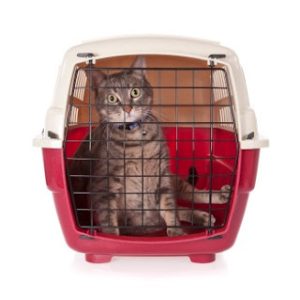Cats 30% less likely to receive veterinary care than dogs
Patty cringes at the idea of taking Muffin, her 12-year-old Persian cat to the veterinarian. She envisions the ten-minute wrangle to catch her, the acrobatics placing Muffin in the pet carrier, and the ear-piercing protest on route to the hospital. Patty observes Muffin lounging contently on the couch, considers her cat’s healthy appetite, trouble-free litter box use, and indoor lifestyle. Patty puts the carrier away declaring, “Why would I want to go through the hassle of taking her into the vet when I can see she is perfectly healthy.”
But skipping that veterinary checkup could mean big trouble for Muffin though.
Senior cats over seven years old can develop diseases such as hyperthyroidism, hypertension, osteoarthritis, kidney disease, and diabetes. And failing to detect these problems can lead to more advanced health problems, less treatment options, less favorable outcomes, and higher future veterinary costs down the road.
Why Are Cats Forgotten?
In the U.S. cats are the most popular household pet, with over 80 million pet cats nationwide. But despite the cat’s status as top pet, they are 30% less likely to be taken to the veterinarian than their canine counterparts. So why don’t cats receive the same veterinary care that dogs do?
There are many reasons why cat owners might not present the cat to the veterinarian. Cat owners may not see perceive a health concern. Cats don’t typically complain, especially with chronic developing diseases, so cat owners miss the boat if they expect kitty to tell them when they are sick. The self-sufficient feline nature makes it is more difficult for pet owners to detect abnormalities in appetite, elimination and behavior.
The economy is a common reason that some pet owners fail to get kitty in to the veterinary office. Some cat owners forgo preventative veterinary visits as a means to minimize costs, not realizing the long term health consequences. And like Muffin’s owner, many cat owners’ just don’t want to stress the cat and chose to skip the vet travel and feline melodramatics.
Some cat owners don’t value the veterinary examination or the health clues it provides. And preventative pet care for some owners consists solely by vaccinations, and when those aren’t pursued, veterinary care falls by the wayside.
My Perspective
In my veterinary office I’ve seen cat patients whose last veterinary exam was many years ago…two, three or even ten years ago. That’s a long time for a cat’s medical problems to brew and develop. Sometimes it’s already too late, and advanced disease has set in. I’d much rather see those cats years before when we can better help them, rather than at a euthanasia visit.
During a veterinary exam, the doctor performs a comprehensive examination to detect abnormalities. Maybe it’s a new lump, a change in body condition, an altered stance, a tell-tale odor of kidney disease, or a useful clue provided by the owner’s health history. The veterinary examination is the best $41 you can invest in your cat’s health and which generates teamwork between you and your vet to keep your pet healthy.
Resolutions for the Future
No wonder cats are the favored pet with their gorgeous looks, complex personalities and mysterious aura. Resolve to keep your kitty healthy in 2013 and ensure your cat gets to the veterinarian at least once a year, although twice a year is preferred for senior cats. When that next veterinary visit comes, be armed with confidence, patience, and of course, a sturdy pet carrier.


